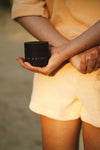
SKIN ADVICE
ACNE & IMPURITIES
- The skin is experiencing skin imperfections such as subcutaneous inflammations.
- The skin is dealing with pimples and/or blackheads.
- The skin has enlarged pores and/or impurities.
- An oily skin with a thickening of the stratum corneum and poor blood circulation.
SHINY SKIN
- The skin has an overactive sebum production, causing the skin to shine.
- The skin is imbalanced because the oil and moisture levels are not in optimal condition.
YOUNG & NORMAL SKIN
- The skin has an even, radiant, and healthy complexion.
- The skin has a fine texture with inconspicuous pores.
- The skin feels comfortable, resilient, and soft.
SENSITIVE & RED SKIN
- The skin is characterized by dryness, redness, irritations, and flaking.
- The skin is delicate, feels uncomfortable, tight, and tends to itch.
- The skin is sensitive to external influences.
- The skin may react allergically to perfume or other allergens.
- Nutrition, stress, illness, and temperature changes can lead to an imbalance in the skin, causing more pronounced reactions than normal.
- Skin characterized by rosacea and eczema.
DRY & FLAKY SKIN
- The skin feels tight after facial cleansing or showering.
- The skin feels tense, rough, dry, and may be flaky. The combination of tense, rough, dry, and flaky may seem like a lot; you can choose the terms that best describe the specific characteristics.
- The skin has a very fine texture and shows dry lines.
- The skin tends to sensitivity and/or redness.
- The skin does not feel comfortable and soft.
- The skin is in need of care with valuable nutrients that penetrate deeply into the skin.
DEHYDRATED & TIGHT SKIN
- The skin feels tight, especially after showering.
- The skin has visible fine lines.
- Dehydration can occur with any skin type.
- The skin needs more moisture.
- The skin feels uncomfortable and tight, lacking flexibility and elasticity.
- Spending a lot of time in cooled or heated spaces increases the likelihood of dehydrated skin.










